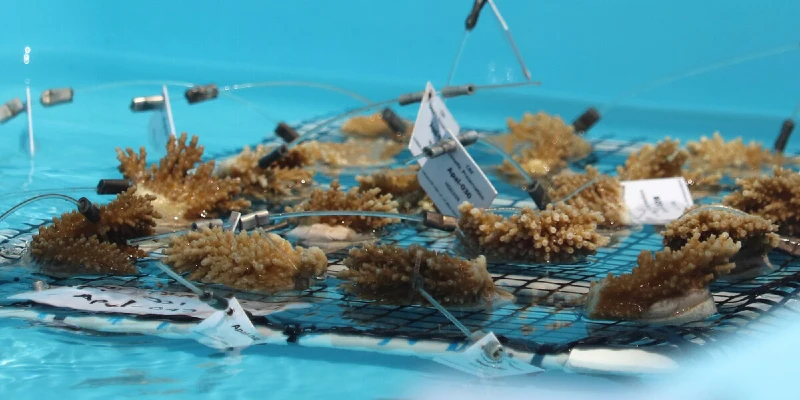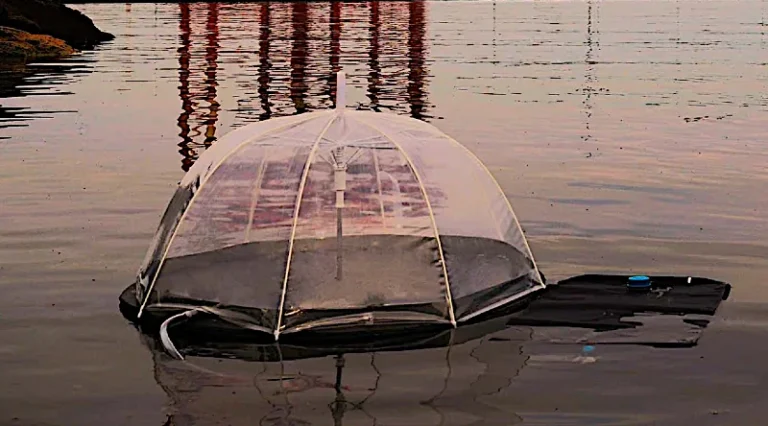Florida’s toasty ocean waters, especially around the Keys, have become so hostile to its famed third-largest barrier reef in the world that experts are transporting coral from sea-based nurseries to more temperate land-based environments.
This month, the sea around Florida has reached alarmingly high temperatures, posing a significant danger to its iconic barrier reef.
“Coral, fish, lobsters – none of these marine species thrive in scorching waters. We’re on the brink of seeing a cascade of devastating consequences, from massive fish to turtle die-offs,” stated Alex Neufeld from the Coral Restoration Foundation.
Earlier this month, water temperatures at the surface soared beyond 90°F (32.2°C), with a shocking peak of 101.1°F recorded in Manatee Bay, near Key Largo. Typically, coral can withstand temperatures ranging from 70 to 84°F (21 to 28.8°C).
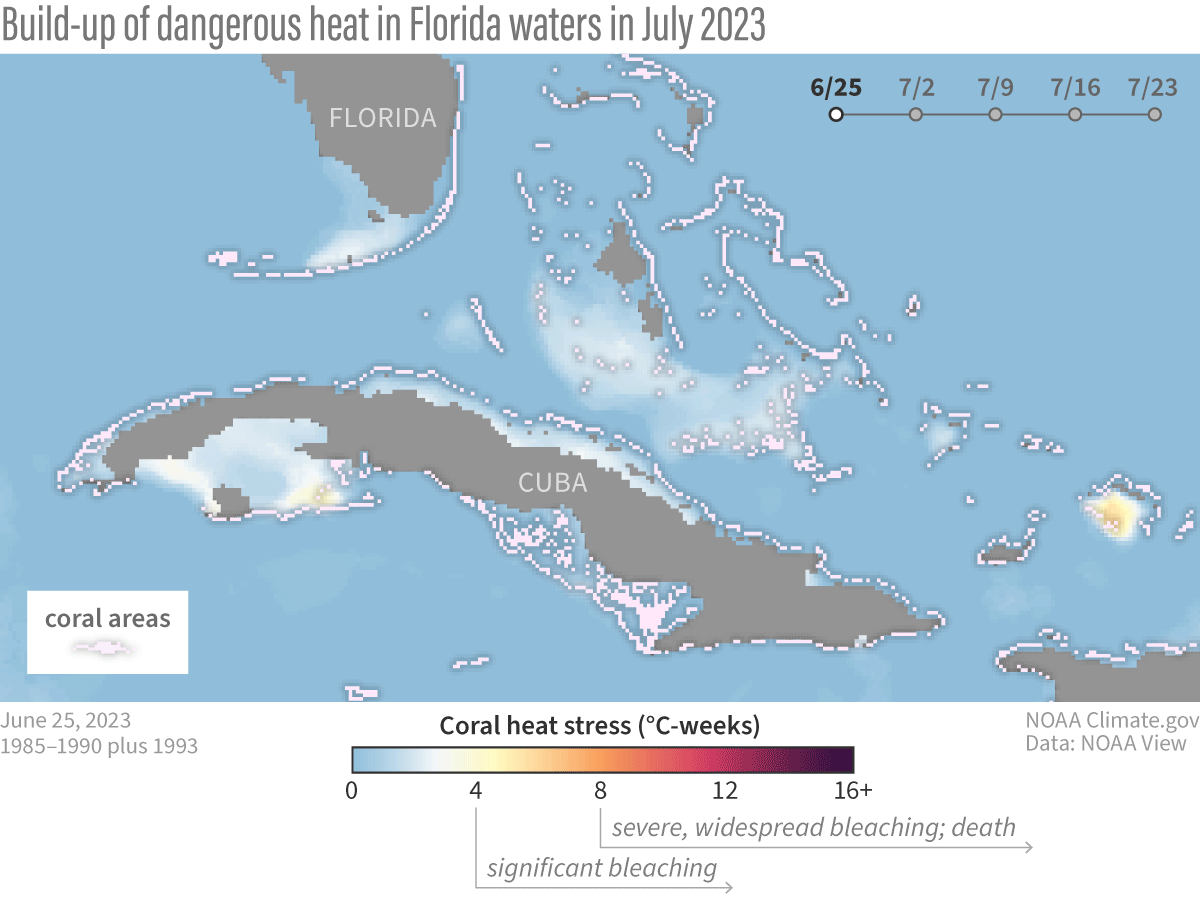
“It’s the most severe heating I’ve witnessed. The impact could potentially be the worst the Keys has ever faced,” Neufeld shared.
Neufeld’s organization, in collaboration with other local entities, has swiftly taken measures to harvest and preserve various coral strains. They’re being relocated to terrestrial facilities where their environment can be closely monitored and optimized.
As scientists hustle to shield marine life inherent to the reef, local businesses express growing concerns about the repercussions for tourism in the Keys.
Brian Branigan, a seasoned boat captain from Big Pine Key, expressed his dismay, “The recent escalation is heart-wrenching. Witnessing the state of the underwater world firsthand was deeply moving and distressing.”
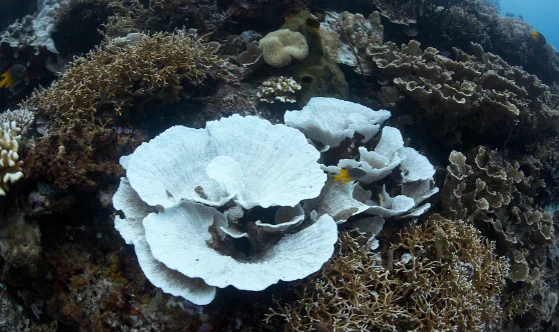
Indeed, beneath the waves, marine life like barracudas, surgeonfish, and parrotfish swim around a once vibrant reef, now showing signs of intense stress as its corals turn pale. The coral bleaching phenomenon seems to be intensifying this year, even though summer’s peak heat is yet to come.
This bleaching is a distress signal from corals, as they release vital algae that lend them nutrients and hue.
The fallout from the deteriorating reef health could have repercussions onshore.
The National Oceanic and Atmospheric Administration has indicated that Florida’s coral ecosystems contribute an impressive $2 billion to local coffers and sustain over 70,000 jobs.
Brad Roberts, a visitor from Fort Myers, noted, “The ongoing degradation is heartbreaking. The livelihood of many locals’ hinges on these reefs. If the coral dies, it might deter potential visitors.”
Sport fishing enthusiasts, a major draw for the region, may reconsider their loyalty to the area. Roberts, who works in insurance, commented on the likelihood of tourists seeking alternatives if their experiences continue to disappoint.

Branigan, pictured left, a diving veteran and boat rental entrepreneur, is deeply worried about the potential economic blow. “We’re bracing for the financial fallout of these ecological changes. The ramifications could be deeply unsettling.”
Amidst these concerns, Neufeld and his scientific peers are focused on relocating corals from their native habitats.
“For the past fortnight, organizations like ours have been on a mission to transition these corals to safer, cooler environments on land,” Neufeld explained.
Their efforts are crucial not only for the marine ecosystem but also for coastal communities. Reefs, beyond being marine biodiversity hotspots, also serve as frontline defenses against intensifying hurricanes and storm surges, exacerbated by climate change.
The Critical Role of Coral in the Florida Keys
The shimmering waters and vibrant marine life of the Florida Keys are synonymous with its majestic coral reefs. Often considered the cornerstone of marine ecosystems, these underwater wonders not only provide a sanctuary for countless marine species but also play a pivotal role in supporting human livelihoods and protecting coastal communities.
But what happens when these vital ecosystems face the threat of extinction?
The repercussions of coral loss extend far beyond just the marine environment. Delving deeper into the potential consequences of diminishing coral in the Florida Keys provides a stark reminder of the intricate balance between nature and society.
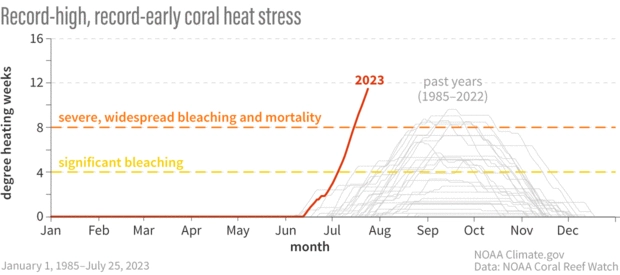
Consequences of Coral Loss in the Florida Keys Region
Environmental Impact
- Biodiversity Loss: Coral reefs are often dubbed the “rainforests of the sea” due to their incredible biodiversity. A significant loss of coral would result in a dramatic decline in marine species that rely on reefs for habitat, spawning, and protection from predators. The ripple effect would impact various species, from tiny invertebrates to large fish.
- Ecosystem Disruption: As corals die, the intricate food web they support will unravel. This can lead to an increase in certain species while others diminish, resulting in an imbalanced ecosystem.
- Reduced Coastal Protection: Coral reefs act as natural barriers against storm surges and hurricanes. Without them, coastal areas, including many in Florida, become more vulnerable to erosion and flooding during storms, endangering human lives and properties.
Economic Implications
- Decline in Tourism: The Florida Keys attract millions of tourists annually due to its vibrant coral reefs, drawing snorkelers, divers, and marine enthusiasts. A dying reef can lead to a significant drop in tourism, which is a primary source of income for many locals.
- Fisheries Impact: A healthy coral reef is essential for the life cycle of many fish species, both commercially valuable ones and those crucial for subsistence fishing. The decline of reefs would adversely affect fish populations, thereby threatening the livelihood of local fishermen and increasing the price of seafood.
- Costly Coastal Defenses: As natural barriers degrade, there would be a pressing need to invest in artificial coastal defenses, leading to considerable economic expenditures.
Societal and Cultural Ramifications
- Loss of Livelihood: From fishing to tourism, many locals depend directly on the reef. A declining reef health can thus lead to unemployment and reduced income, exacerbating socio-economic challenges.
- Cultural Impact: For many communities in and around the Florida Keys, the reef is not just an economic asset, but also a cultural and spiritual one. Its loss would signify the loss of traditions, practices, and a way of life centered around the ocean.
Global Implications
- Feedback Loop of Climate Change: Coral reefs play a role in carbon sequestration. Dead or dying reefs release stored carbon back into the atmosphere, reinforcing the cycle of global warming.
- Example for Other Regions: The fate of the Florida Keys could serve as a cautionary tale for other coral-rich regions around the world, highlighting the urgent need for conservation.
In essence, the death or extinction of corals in the Florida Keys would have a domino effect, touching various facets of life, both locally and globally. The intertwined nature of environmental, economic, and societal consequences underscores the importance of conserving and restoring these vital marine ecosystems.
The Coral Restoration Foundation operates 7 offshore coral nurseries in South Florida, including the one pictured at the right.
The Coral Trees are secured to the ocean floor and buoyed using a subsurface float. The coral fragments are hung using monofilament line, with each tree capable of holding up to 100 coral fragments.
The largest nursery covers an acre-and-a-half and are home to 11 different coral species.
More To Discover
- Transparency Gap: Companies Fail to Report Impact of Environmental Initiatives
- Fish Farms Intended to Rescue Wild Salmon Are Ironically Leading to Their Decline
- Al Dhafra Solar Farm: The World’s Largest Single-Site Solar Farm Shines On The UAE’s Renewable Energy Ambitions
- 8 Alarming Trends in Corporate Control of Our Food Supply
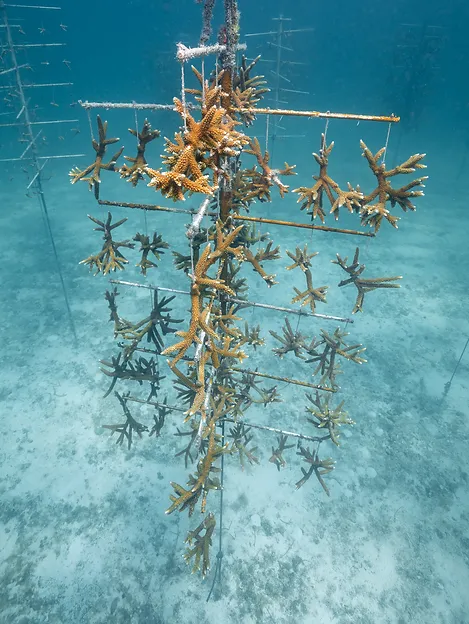
About the Coral Restoration Foundation (CRF)
Founded in response to the wide-scale loss of corals, the Coral Restoration Foundation (CRF) has its roots in the picturesque waters of the Florida Keys. As the world’s largest non-profit marine-conservation organization dedicated to restoring coral reefs, CRF has been a beacon of hope for declining marine ecosystems since its inception.
With a mission centered around “restoring our coral reefs, ensuring their survival for future generations,” CRF employs a blend of science, technology, and passion to rejuvenate degraded reef systems. The organization has developed pioneering techniques for large-scale cultivation, outplanting, and monitoring of several key, reef-building coral species.
CRF’s holistic approach extends beyond coral propagation. They invest heavily in research, partnerships, and educational programs to create a network of informed and empowered individuals who can champion the cause of coral conservation globally. Their outreach initiatives, educational dives, workshops, and citizen science programs make coral conservation an accessible mission for all.
Underpinning all their efforts is a team of dedicated marine biologists, conservationists, and ocean enthusiasts, all driven by the same vision: a world where vibrant and thriving coral reefs support a balanced and flourishing ocean ecosystem. Through their groundbreaking efforts and collaborations, the Coral Restoration Foundation remains a beacon for coral reef recovery and sets a precedent for marine conservation worldwide.








